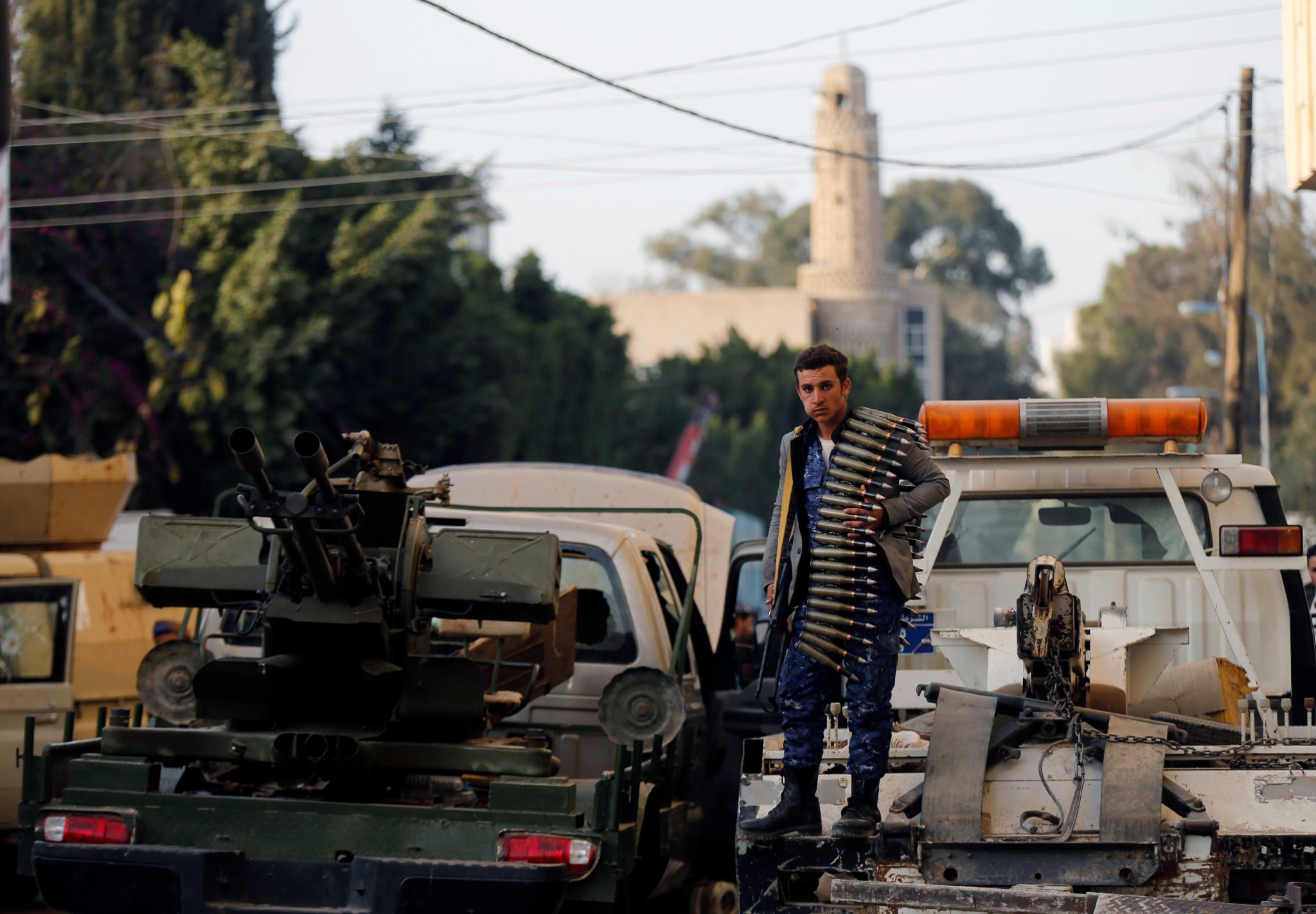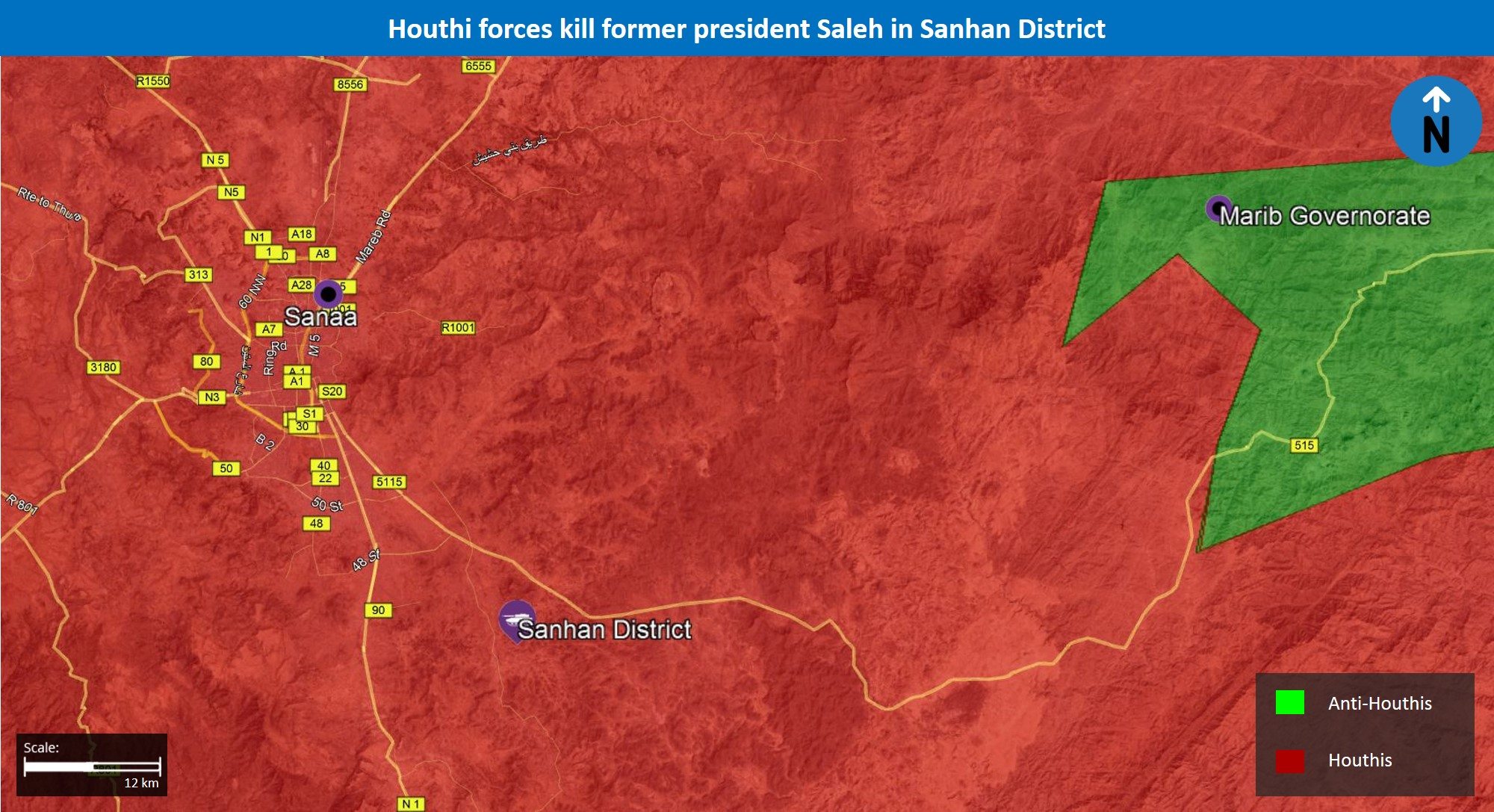Current Situations
Click here to see Map Legend
The General People’s Congress, which is the party of the former President Ali Abdullah Saleh, reportedly announced that Saleh was killed by Houthi forces in Sanaa Governorate on December 4.
According to reports, Houthi forces ambushed Saleh’s vehicle in Sanhan District, located just southeast of Sanaa City. Houthis reportedly killed Saleh and other party officials who were in the vehicle with him.
Saleh had reportedly been fleeing Sanaa following the destruction of his home by Houthi forces.
Houthi leader Abd al-Malik Bid al-Din al-Houthi praised the assassination, calling for a march to take place in Sanaa on December 5.
Assessments & Forecast
Saleh’s assassination follows the latest uptick in hostilities between forces loyal to the former president and Houthis over the last week. The clashes triggered Saleh’s televised address, in which he called for the end of the Houthis’ “military rule” and asked to “open a new page with neighboring countries.” The statements likely provoked the Houthis, who generally hold a hardline stance against dissent and who perceived Saleh’s announcement as a means of reaching out to the Saudi government. While Houthi leadership has already praised the assassination, its occurrence constitutes a setback for Houthi forces overall. Saleh’s assassination will shift the current balance of powers among armed groups in Yemen, most notably in Sanaa, as pro-Saleh forces who previously fought alongside the Houthis will no longer do so. While a segment of pro-Saleh forces will continue to fight against Houthis under the same entity, many of these elements will likely go as far as joining anti-Houthi forces.
Anti-Houthi forces are likely to capitalize on ongoing disarray in order to make gains across Yemen, as they have already managed to exploit the clashes recorded between Houthis and pro-Saleh factions in Sanaa City during the past few days. As such, the Saudi-led Coalition already announced the start of a new Operation titled “Arabian Sanaa”, in which forces already declared on December 4 the opening of additional fronts around the Sanaa Governorate in order to prepare for an assault on the pro-Houthi-held capital. This threat presented by anti-Houthis is likely to cause the Houthis to take desperate measures to maintain its standing in the conflict. This could manifest in renewed efforts to hit sensitive targets deep in Saudi Arabian territory, as was the case on November 4 when a ballistic missile was intercepted by the Royal Saudi Air Defense (RSAD) over an open area east of Riyadh’s King Khalid International Airport. Houthis may even attempt to target the UAE, as they already claimed to do on December 3, although Emirate authorities denied this.
Sunni jihadist militant groups are likely to take advantage of not only the internal factions existing within pro-Houthi forces but also the likely movement of anti-Houthi forces to Sanaa in order to make its own gains in southern and eastern Yemen. The hostilities between both Houthi and anti-Houthi forces that will continue in the coming days will serve as a distraction for these parties and likely worsen the existing security vacuum already present in multiple regions. Al-Qaeda in the Arabian Peninsula (AQAP) militants will likely make efforts to gain back lost territory in Bayda and Hadramaut Governorates by staging additional attacks against Saudi-led coalition forces throughout the region. Islamic State (IS)-affiliated Wilayat Aden-Abyan will likely increase its actions in Aden in order to disorient anti-Houthi forces and weaken the security apparatus. Both militant groups pose major risks to territories east and south of Sanaa.
FORECAST: Overall, the reported assassination of Saleh is likely to lead to armed hostilities between pro-Saleh and Houthi forces across Yemen, especially in Sanaa City. In the long term, Houthis’ standing in the conflict is likely to be significantly weakened given this loss of manpower and support from pro-Saleh forces. Anti-Houthi forces are likely to make advances against Houthis east of Sanaa in the coming days, thereby setting them up for an offensive on Sanaa itself. Finally, jihadist groups are likely to retake footholds in central Yemen where they maintain their presence and take advantage of vulnerabilities brought on by the ongoing conflict.
Recommendations
It is advised that those remaining in Sanaa and Aden should initiate contingency and emergency evacuation plans given the international intervention and airstrikes. Contact us at [email protected] or +44 20-3540-0434 for itinerary and contingency support plans.
We advise against all travel to outlying areas and overland travel, due to the limited government and security presence, ongoing clashes and airstrikes, as well as the heightened threat of attacks and kidnappings.
Foreigners, particularly Westerners, continuing to operate in Yemen are additionally advised to maintain a low profile, exercise heightened vigilance, and avoid locales frequented by foreign, particularly Western nationals. To mitigate the risk of attacks or abductions, ensure that places of stay are equipped with sufficient perimeter security details, alter travel routes, and avoid disclosing sensitive itinerary information to unknown individuals.
Read more risk assessments in our security blog


